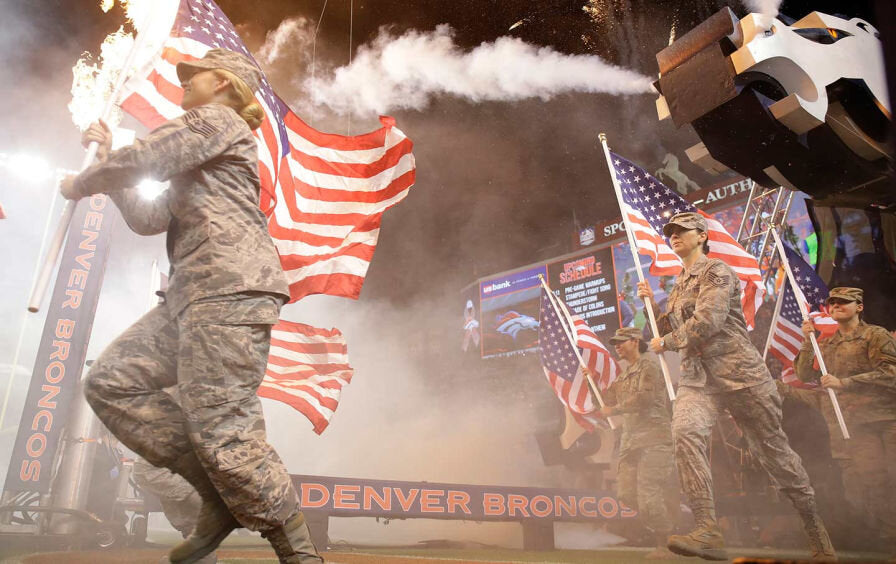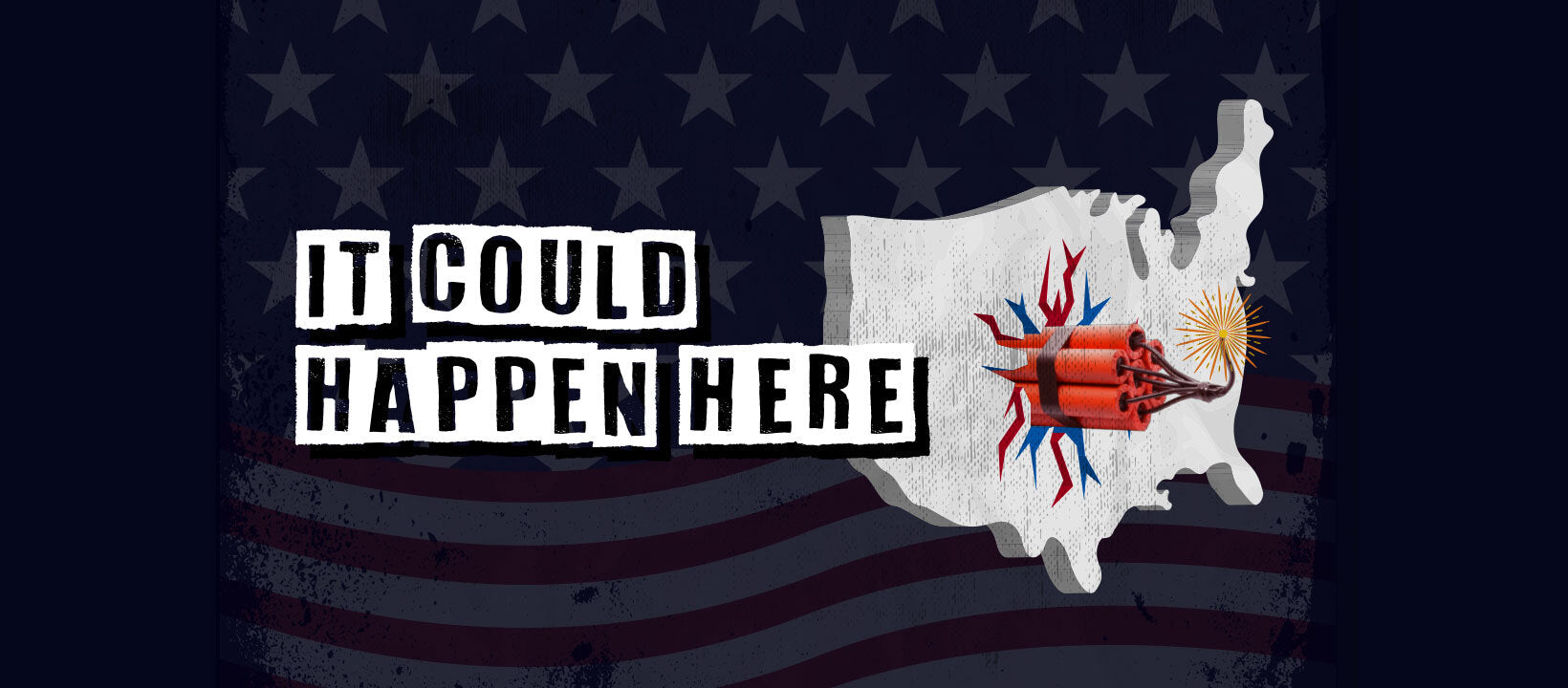
The Great American Vet Fet, Part 1: Establishing the Fetish
You’re not going to like this and I am opening myself up to everyone’s favorite dick measuring contest (what branch was he? What unit? My boy was with him in RC-South and said he’s a turd) but it must be said: the American public, no matter what end of the political spectrum, doesn’t respect you. They aren’t fighting for you when they post about kneeling football players. Your Veteran’s Day discounts or 10% off at Lowes aren’t because businesses want to do the right thing. CrossFit Hero WODs aren’t honoring your dead friends. American flags on made in China t-shirts—against Flag Code—aren’t patriotic.
They don’t love you. You’re their fetish.
The Merriam-Webster Dictionary defines fetish as “an object believed…to protect or aid its owner” or “an object of irrational reverence or obsessive devotion.”
And all this time you thought a fetish is what you got from all that weird porn on the portable hard drive everyone passed around the COP.
Let’s risk sounding like the latest green haired, septum ringed chick with Doc Marten’s, clutching a blown-out copy of the SCUM Manifesto, and break these definitions down Critical Theory style. An object (that object is or was you) believed to…protect or aid its owner (that’s the public) or—and ultimately my point—an object (there’s that heavy word again, my brovet friends) of irrational reverence or obsessive devotion. The public certainly displays irrational reverence but—for those in the back that still don’t hear me—doesn’t love you no matter their obsessive devotion.
The hollowest arguments for OEF/OIF were ones that connected military action in Southwest Asia with defending the Constitution or American values even though retribution, deterrence, shaping geopolitical relationships, or seizing footprints in powder kegs from the grips of Near Peers are all excellent reasons to spend blood and treasure in the effort to make the world more secure—A.K.A. being able to predict the future with some accuracy. The American government hid those motives as the reasons behind the invasion of Iraq, OIF in the Philippines, FID missions in the Maghreb or any of the other actions taken in our solo world war, even though we all know better.
It’s kind of like the Zapruder film, where’s it’s very obvious that JFK is shot from the rear but also—sure as shit—hit from the front despite every Congressional Investigation’s insistence that there’s nothing to see here folks, don’t let your eyes deceive you, it truly is one, very magic bullet.
Incorporating what you see into a narrative is impossible because of everything you “know”: American Presidents don’t get murdered in broad daylight and American military forces only attack when it’s in defense of liberty. The first assumption about witnessing a coup in real-time is likely jingoistic—something like that only happens over there—while the second, the reluctance of America to engage, and only if the cause is righteous, is from an unconscious assumption we all carry: democracy’s citizens abhor standing armies.
Let’s consult the Founders: that group—depending on whose “side” you’re on—of infallible Moses-like geniuses or unredeemable white men encoding a bent world-view in legalities. Either way, and in spite of your opinion (which is not a fact, may I remind you), these men created the framework you reside in and—like all Western philosophy—their thoughts have galvanized into your basic political beliefs. James Madison said “a standing army is one of the greatest mischiefs that can possibly happen.” Alexander Hamilton, when he isn’t spitting bars and choreographing his way into our tender hearts, believed “standing armies are dangerous to liberty,” this from a guy who wanted the executive branch of the American government to be run by a king. Hamilton thought having in-bred hemophiliacs and their unelected descendants in charge creates more freedom than leaving Camp Lejeune as a permanent installation.
Think about that for a second.
Before the National Security Act of 1948 created the Defense Department, Central Intelligence Agency, and an entire host of security apparatuses, no one had to worry much about a standing army in America because the Founders knew Western history. We really should too, especially with Stoicism’s social media popularity (neatly summarized as: give less fucks about shit you can’t change) but since no one actually reads Greek or Roman history, we can boil it down to the fact that paid, professional armies always crash the democracy party and no one can send them home for being too drunk because they have all the weapons. Americans have always been suspicious of standing armies and never had the desire to fund one until after World War II.
You can’t blame them really. The history of distrust extends beyond the ancient world to medieval and Enlightenment era armies that were essentially land pirates run by warlords (remember those fun guys from Afghanistan? They’d pay the Taliban to attack you at night so you’d slip them a cool million to fund and stand up their “Afghan Local Police” during the day). The bottom of the barrel in society, those not of aristocratic origin and with a psychopathic death wish, would join these armed groups. These armies would fight on behalf of the king for payment in the form of whatever wasn’t bolted down in the places they fought. No paycheck, no invoicing. These men stole whatever they wanted in exchange for merking dudes on the behalf of some “well-born” nerd.
Not exactly a noble calling.
To overcome America’s unconscious bias with not only a standing army after 1948 but a professional, all-volunteer servicemembers when the draft ended in 1973, the official narrative had to tie the global military activities of an initially bi-polar superpower that transitioned, after the fall of the Soviet Union, into a global hegemon to the defense of democracy, traditional liberal values, and the Constitution. But I still can’t understand, eight years later, how I was defending the first, second, or the other 25 amendments interrogating dirt farmers in Tarin Kowt.
Military intellectuals supported this official narrative by appealing to primal impulses that transcend the rational logic undergirding democracy. Lt. Col. Dave Grossman in his study on how the military trains young Americans to kill—titled, very aptly, On Killing—details the “sheepdog” concept. You’ve seen the corny t-shirts and memes, but there’s something darker and more significant there than some portly, pew pew guy posting about hunting reptile pedophiles from his moldy basement.
Grossman’s managed to hijack the Jungian Archetype of the warrior. Archetypes are unconscious psychological forms that hold immense meaning for humans. Grossman’s American service member is a sheepdog, a warrior who only uses violence to protect others. Sheepdogs can even be mistaken, at a distance or in the dark, as the wolf. But they are not the same. The wolf stalks the sheep while the proud, noble, and begrudgingly violent sheepdog lives to protect the sheep. The sheepdog is happiest when it engages in combat with wolves that seek to disrupt the herd’s way of life.
The warrior archetype works in a hunter-gatherer society when the next people you meet over the hill either want to trade for dried berries or put your heads on sticks and there’s no way to tell which is going down until it’s too late.
Calling U.S. servicemembers sheepdogs fails in a world of corporate cronyism, autocratic nation-states jockeying for power, drug cartels forming borderless shadow governments, and nuclear proliferation. Those complexities call for disciplined murderers, rationally deployed to achieve logical national goals. Let’s not lie to ourselves anymore. We need murderers. We also need to put them back in the box when they’re finished.
But being called warriors makes us feel good. It means that whatever fucked up stuff we did before we joined and no matter what kind of loser we’ve become after we separated, we’d at least have that.
I was a warrior.
And it gives the American public the ability to play a shell game with their taxes too. They aren’t working themselves to depression and alcoholism to fund land pirates. Their warriors are professionals, globally defending the constitution.
A warrior is their object and truly worth obsessive devotion.
But who guards the guardians? The 2nd Amendment? Let’s not kid ourselves about the power of our right to bear arms, if the National Guard starts rolling down the street in Abramses you’ll become that dude in black track pants that you smoked 15 years ago who still shows up in your dreams.
When did we consent to this as a country? Maybe we didn’t, not overtly at least. In fact, maybe we did all the convincing for “them” and “they” never even had to ask, an inside-out form of self-surveillance. It happened, at the end of the mandatory draft, when they turned all of us from baby killers into heroes. But we’ll explore that in the next essay.
Written By Matt Cricchio
December 7, 2020









